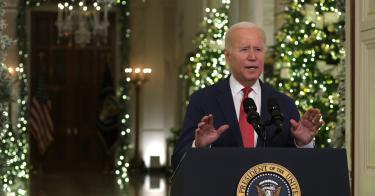Christmas is coming, and Beijing should be grateful for these three gifts from America: policies that strengthen China’s economy at the expense of our own, leaving Americans with higher costs and a weaker economy. China could not ask for a more generous Santa.
#1 Gift: Battery Electric Vehicles. The California Air Resources Board has issued a rule that all new vehicles sold in the Golden State be plug-in hybrid or pure battery powered by 2035. In Washington, President Biden issued an executive order calling for half of the nation’s new vehicle sales to be electric by 2030 and instructed the head of the EPA to “coordinate the agency’s activities” with the State of California.
The rule and executive order trade America’s energy security—its reliance on home-produced oil and natural gas—for dependence on batteries made in China, reportedly partly produced with slave labor from Xinjiang. America cannot produce these batteries at lower cost than those slave-made in China.
Moreover, electric vehicles are more expensive than equivalent gasoline-powered vehicles, so the orders emanating from the White House will raise the costs of transportation for Americans—further weakening the U.S. economy. More money spent on cars means less money spent on other products and services.
>>> Free Economies Are Clean Without Subsidizing Renewables
#2 Gift: Focus on Climate Change. Over the last year Executive Branch agencies have used climate change to justify slowing production and delivery of U.S. oil, natural gas, and coal, and to encourage the use of wind turbines and solar panels made in China. This drives up Americans’ electricity bills. And, once again, it’s the Chinese who profit. Seven of the top 10 wind and solar manufacturers are Chinese. Just to recap:
The Administration is actively discouraging investment in oil, gas, and coal, claiming that such investments pose a risk to the environment. Firms producing and relying on conventional fuels are finding it harder to get capital to expand, because they face higher rates to borrow.
The Department of Transportation is prioritizing climate initiatives such as funding for electric vehicles, charging stations, and electric transit, as well as bike and pedestrian paths.
The Federal Energy Regulatory Commission is slowing approval of new pipelines to carry oil and gas from the interior of the country to consumers and to the coasts, where it can be exported.
The Interior Department has called for fewer leases, higher royalties for oil and gas leases, and a more complex bidding process to screen buyers.
Securities and Exchange Commission Chairman Gary Gensler has proposed rules to require private companies to disclose information about governance and management of climate-related risks.
The Office of the Comptroller of the Currency, which regulates banks, has appointed a new Chief Climate Risk Officer to oversee climate-driven risks to banks. Banks will be discouraged from “risky” lending to oil and gas companies—reducing available capital to develop resources.
Gift #3: Environmental, Social, and Governance (ESG) Movement. Led by BlackRock, Inc., and State Street Global Advisors, major financial institutions are pressuring international development organizations, private corporations, and pension funds not to invest in conventional fuels. This weakens America, which produces these fuels, and helps China, which manufactures wind turbines and solar panels using coal-fired power plants. ESG means fewer jobs for Americans, more jobs for the Chinese.
On its website, State Street suggests four ways to influence companies’ investments, all of which would benefit China. First, require countries adopt regulations to reduce carbon emissions. Second, raise consciousness of climate change through “more ESG education, guidance, solutions, and analytics.” Third, take over corporate boards and use customers and investors “to compel companies and organizations to address climate risks and opportunities.” Finally, organize global pledges to cut emissions to net-zero by 2050.
By following the ESG movement, America is giving up geopolitical power overseas as well as economic strength at home. China is financing the coal-fired power plants in developing countries that American institutions refuse to fund.
>>> We Don’t Need a Costly, Mandated Detour to Electric Cars
Some might justify these gifts to China on the grounds that the world’s climate will benefit from lower emissions from U.S. decarbonization. But China is producing the wind turbines, solar panels, and batteries with coal, increasing global emissions.
Consider that America has 225 coal-fired power plants, and China has 1,118 (half of all the coal-fired plants in the world). Since 2010, America has reduced coal-fired electricity generation by 100,000 megawatts; China has increased it by 580,000 megawatts. Between 2005 and 2020, America cut its carbon dioxide emissions by 970 million metric tons, while China increased its emissions by 4,689 million metric tons.
As America gives China economic advantages this Christmas, American consumers are left with the proverbial lump of coal in their stockings—coal that they are not even permitted to use. They face higher transportation costs, higher electricity costs, and lost jobs.
Such generous gift-giving is not required, especially when the beneficiary is a country that enslaves its people, steals intellectual property from the United States, and threatens our allies and partners.
But what one political party giveth, another can take away. And when the new Congress convenes next year, its new leadership may want to reconsider whether the Administration’s extraordinary generosity toward Beijing should continue.
This piece originally appeared in Forbes https://www.forbes.com/sites/dianafurchtgott-roth/2022/12/20/uncle-sams-three-christmas-gifts-to-china/?sh=78fc2f4210c1



